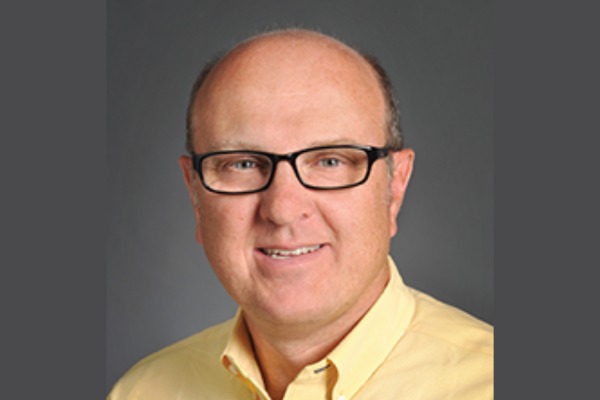
Chorus Community Health Plans’ leader weighs in on Medicaid renewals, prior authorization and housing

Chorus Community Health Plans President Mark Rakowski spoke to Wisconsin Health News this week about the return of Medicaid renewals, prior authorization and the provider-owned health plan’s work around housing.
Rakowski said a little more than 5,000 Medicaid members left Chorus last month, part of 57,000 statewide who lost Medicaid coverage. He noted his plan has around 15 to 20 percent of statewide enrollment.
“That was actually a little encouraging to me, that our decrease was less than our total market share,” he said Thursday.
Edited excerpts from the interview are below.
Wisconsin Health News: How is the Medicaid redetermination process going?
Mark Rakowski: We saw our share of (those 57,000 people) lose eligibility in June. We were told upfront by the (Department of Health Services): Don’t overreact to month one … Those members were very likely to be ineligible due to income, other circumstances … We’re really going to see, probably in the next week, what that July 1 redetermination looked like before we can make any decisions.
The state has done a really nice job of getting us data, getting us reports, getting us information about who is up for renewal 45 days in advance and then mid-month in anticipation. So mid-June, we were notified of what the status is of all of those individuals who were up for renewal, in this case, July 1. Have they completed their application? Have they been approved? Have they been denied? Are they in process? Or have they not done anything yet? And so that data allows us to do a lot more targeted outreach to members.
WHN: Chorus has around 155,000 Medicaid members, following last month’s decline. How many are you expecting to leave the program?
MR: We grew from 123,000 to 160,000 over the course of the public health emergency, a little over a 30 percent increase. We know that we will not maintain that level of enrollment. What percentage will we keep? Maybe 50 percent of that growth? So we added about 37,000 members — 15,000 to 20,000, I expect, will lose eligibility. But until we really start to see what the numbers look like, that’s just kind of a shot in the dark.
WHN: Are you expecting to see any kind of boost in your Affordable Care Act offerings?
MR: We are working with all of the members who do lose Medicaid eligibility to make sure they’re aware of our individual products. Some of them will have coverage through their employer. They aren’t going to be someone that we’ll target or that will be in need of ACA coverage. Maybe 25 percent of the members that lose eligibility, we are hopeful, will look at our ACA products and be a candidate for them.
WHN: A number of folks nationwide have lost coverage due to administrative reasons. How big of a concern is that here?
MR: For Wisconsin, that first month was a little bit of an anomaly. Some of those administrative denials are people not returning their application, people not returning their paperwork. There are reasons that people won’t return it. They have coverage through their employer. They know they don’t need to fill out and return the application because they won’t continue on Medicaid. So I think some of those percentages that we’ve seen nationally, in Indiana and other states, are probably a little inflated in that they’re not really administrative denials. They’re members who aren’t in need of Medicaid any longer, and for the first time, in two to three years, are being asked about it. No one brought it up when they got employer-sponsored coverage a year ago. They continued to be covered by Medicaid. So June, July will be a little better indicator for us.
What we’ve been doing all along is a couple of things. Number one, for our entire population, reminding them to update their address in ForwardHealth, making sure that department has the current address — home address, email, phone number — so that communication can work.
The other big piece of this that can really be beneficial — we’re working with providers. They have a vested interest in this as well. They don’t want their patients to be uninsured. Especially if they’ve got an upcoming appointment, providers have an opportunity to remind their patients who have Medicaid to do that same thing, to update their demographic information, to make sure they respond to that notification when they get it. In many cases, patients trust their providers, maybe more so than they trust their insurance company. So, if that message comes from a provider, it may carry more weight.
WHN: Are you looking for any kind of additional support to boost awareness or help people find coverage?
MR: Remains to be seen. We’re hearing that there are a number of individuals who have not responded to the application. We’re going to have to start tracking that more closely once it starts to occur, to determine if any of the tactics need to be refined … With 155,000 members, we know we don’t have the means in house or the staff in house to outreach to all of those members. We’ve partnered with a local organization Beyond Vision, a community-based organization here in southeast Wisconsin that employs individuals who are blind. They are doing outreach for us … I think it’s going to be a really strong relationship that can benefit our members who do lose eligibility.
WHN: Patients and providers have had frustrations with prior authorization for years. Where does Chorus stand on this issue?
MR: When we started what was Children’s Community Health Plan, now Chorus Community Health Plans, back in 2006, we really had a philosophy that we wanted to be kinder and gentler … We want to reduce friction. We know what irritates providers. So we’ve always had a much smaller prior authorization list than other health plans. When we looked at the numbers on our Medicaid line of business, less than 1 percent of the services that are provided to our members require a prior authorization.
… The whole prior authorization debate underneath the surface is more about denials … If we deny something, a provider has the right to appeal that denial. And the first level is an appeal to us. We go to an independent third party to review that case. If they continue to uphold the denial, the provider has the right to appeal to the state of Wisconsin. And the state has shared with us those provider appeal rates … We have the second lowest provider appeal rate in the state of Wisconsin. It’s in fact about eight times less than the health plans that are on the high end of that provider appeal rate. So we think we’ve created a plan that providers are satisfied with and that we’re easy to work with.
WHN: Federal regulators are seeking to require electronic processing, shorter time frames on decision-making and more transparency. Are you concerned or do you welcome these changes?
MR: We actually welcome them … Our philosophy is to remove those hurdles for providers and members. Our providers today submit their requests electronically. So we already comply with some of those proposed requirements … If there is an urgent request, we have between 24 and 72 hours to respond to that request … and 99.7% of our requests are responded to in those time frames …
Sometimes I think some of the criticism is overblown a little bit. Or maybe there’s a few bad apples out there, and they tend to lump every payer into that bucket of folks that are not being compliant. But again, when we talk with our providers, very few issues come up.
WHN: Chorus has focused in recent years on housing, partnering with the Milwaukee County Housing Division. Where do efforts stand?
MR: We provide financial support to fund a county employee, a navigator. That navigator works exclusively with our membership, members who are homeless or who are facing housing instability … The other portion is actually paying rent, paying security deposits and, in some cases, paying for some furnishings for individuals who in many cases are homeless or who are changing their housing location. We like to say it’s a bridge. It’s not a permanent source of funding for those families. The county then finds them a more permanent funding stream …
We’ve increased our funding over time to the county. We are absolutely finding there is a rate of return on this. We’re seeing a decrease in emergency room visits for individuals. We’re seeing a decrease in inpatient admissions … If someone is homeless, they’re not worried about other things in their life. They’re not worried about healthcare for themselves or their families. They’re worried about getting a roof over their heads. Once we solve that problem, then we can work on the other pieces …
As of the end of 2022, we’ve provided support to over 1,800 members. That would be parents, kids. That includes over 400 individuals who we’ve actually paid the rent for on a short-term basis. The other 1,400 out of that 1,800 were just that navigation, that day-to-day support to get through the system, to work with landlords where needed; to find utility assistance, if needed; to find support programs, in some cases; to help pay the bills.
WHN: Do you see a need to grow this program?
MR: We certainly are considering increasing that support. Today, the funding that we have with the state of Wisconsin for the Medicaid program makes it a little more difficult to do. The dollars we expend are administrative. They’re not considered a medical expenditure. They’re not considered a covered medical service. They ultimately reduce our medical spend. But spending administrative dollars to reduce medical expenses ends up being a little bit of a death spiral. With the way the funding of the program works, as medical expenses decrease, administrative payments to the health plans decrease. By doing the right thing, by reducing medical expenses, over time, we get less administrative dollars and can’t afford then to spend more of that fixed pot of money to reduce medical expenses. In a perfect world, the expenses we have with Milwaukee County would be considered a medical expense.
… We’d like to expand beyond housing. We’d like to expand to other counties. Milwaukee County is where the majority of our enrollment is, but we recognize we need to develop similar relationships in Racine, Kenosha, and Brown County, for example.
And we have gone beyond housing. Food insecurity is certainly a priority area for us to address … For many of our members who are facing food insecurity, it’s because their housing is unstable. They don’t necessarily have a working refrigerator. They don’t have a large enough house or a stable enough living environment to have a meal every night with fresh fruits and vegetables. So the two go hand-in-hand for us. We’re trying to address that food insecurity, but housing continues to be the number one priority.
This article first appeared in the Wisconsin Health News daily email newsletter. Sign up for your free trial here.





